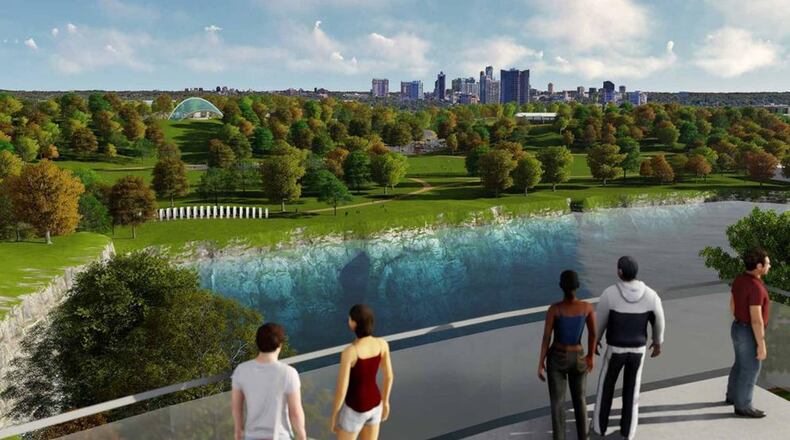After outcry about rising rents and real estate taxes forcing longtime Atlanta residents out of their westside neighborhoods, Mayor Keisha Lance Bottoms issued an executive order on Monday prohibiting new construction permits in the area around the new Westside Park.
For years, city officials have promised a new multimillion-dollar park that would benefit one of the city’s more impoverished areas.
But a loose coalition of community groups is arguing that the park is destroying the community it is supposed to help.
Bottoms' order followed an Atlanta Journal-Constitution report earlier this month about a lawsuit that revealed a small group of investors' attempts to cash in on depressed real estate prices near the park.
And it comes after multiple public meetings featuring uproar about how the infusion of cash into the city’s impoverished area has led to widespread displacement of longtime residents.
Bottoms’ order on Monday suggests she is taking the concerns seriously.
“A key pillar to the Administration’s comprehensive affordable housing plan is ensuring long-term residents are not priced out of the neighborhoods they have built,” Bottoms said in a statement. “We know that every permit triggers some form of change in these communities, and it is of the utmost importance that development is carried out in a deliberate, fair and thoughtful manner.”
The city council will still have to approve the order, which Bottoms wants in place for at least the next 180 days.
According to a statement, Bottoms wants to identify the area that the development of the Westide Park is impacting most and establish an “Equitable Development Framework.” She also wants to build a transportation plan and renew conversations between the parks department and the Beltine — a city affiliate agency that is building a 22-mile loop of trails and future transit.
The Beltline, which will connect to the Westside Park, was originally billed as a project that would connect city neighborhoods — rich and poor. But instead, affordable housing advocates have long argued that as construction progresses, the increasing value of the land around the Beltline has turned the project into a dividing line between the haves and have nots.
The Grove Park neighborhood sits just south of the park.
Several top city officials attended a neighborhood association meeting there earlier this month and were blasted by residents. Many said they didn’t want the Westside Park because it seemed to be hurting their community, not improving it.
They also complained that the city had given little thought about how the park would affect them and that they were seeing their neighbors forced from their homes at alarming rates because of rising rents and taxes.
“Can you commit to not cutting a ribbon on this thing until we get the housing, transportation and economic development plans and implementations happening?” asked Justin Bleeker, executive director of Grove Park Renewal Inc., a community nonprofit focused on stabilizing housing costs for low-income residents.
For 36 seconds, about half-dozen city officials stood in silence at the front of the church basement where the meeting was held, including the transportation and parks commissioners.
The question went unanswered.
Bottoms’ order didn’t delay the scheduled May 1 ribbon cutting on the $26 million first phase of the project, and her prohibition on new construction permits won’t affect those already issued.
At the council’s Community Development and Human Services Committee meeting last week, Taylor Pruitt, a Grove Park resident, said the city needed to make critical choices at an important time.
“Will Atlanta fall in line with other major cities and become a city that’s too expensive for the poor, a place for only the elite and the affluent?” he asked. “Will the culture of our city be whitewashed recreated into a new Atlanta?”
Committee chairman Matt Westmoreland noted that home prices in Grove Park had risen more $100,000 since several council members, himself included, stood with shovels and broke ground on the Westside Park in fall 2018.
“We need to own that and fix it,” Westmoreland said.
About the Author
Keep Reading
The Latest
Featured



